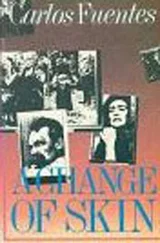Yet Kafka is not a political analyst. He is a writer. This means that, unlike what can happen in the realm of political history, in the realm of personal history and imagination entire dramas of doubts, blindness, ambivalence, and mute acts of heroism can be played out in the space of a room, an office, or a bed, complementing the exercise of power.
Gregor Samsa, in The Metamorphosis, becomes a bug to escape not only from his father but also from his manager, his business, bureaucracy (as Félix Guattari and Gilles Deleuze suggest in their study entitled Kafka: Toward a Minor Literature). Hopenhayn very astutely notes that Samsa the bug is not entirely a bug. He continues to think. The conscience uses the body as a screen while imprisoning it at the same time. And if there is some irony there, we can attribute it to the fact that the very essence of irony is to take us out of context and create a schism between ourselves and the world. The void then becomes the nexus between us and the world. This means that irony, as Hopenhayn brilliantly concludes, is metamorphosis in and of itself. The law is mad but it is the law. And an inexhaustible litany of obligations is what precludes Samsa, Josef K, and the Land Surveyor from fulfilling their obligations. For this reason they will be punished.
If Franz Kafka gave a face to the horrors brought about by power in the twentieth century, he may very well be a prophet of power in the twenty-first century as well. Power was made visible — too visible — in Hitler’s Auschwitz and Stalin’s Gulag. Today, power has learned how to become invisible, relying as never before on the premise that the victim himself will grant power all the power it needs.
So what about the Left? Does it have a raison d’être after all its miserable failures, opportunism, betrayals, and passivity throughout the twentieth century? I want to remember its victories as well here, because I believe in them too — I believe in the fight against fascism in Europe, in the United States, in Latin America. And the fight against the left-wing dictatorships too: the democracy of the Left manifested itself in figures as diverse as the poet Osip Mandelstam in Russia, the journalist Carlos Franqui in Cuba, writers like Milan Kundera, Gyorgy Konrad, and Leszek Kolakowski in Central Europe. .
What about its situation today? The Berlin Wall fell. The Soviet Union disintegrated. Social injustice, however, did not crumble. Man’s exploitation of his fellow man did not decrease.
Two reductionist theories of economy and society petered out as the past century and millennium came to a close. One was the so-called “real socialism,” which was neither real nor socialism, but rather the totalitarian and dogmatic façade of an economy that enjoyed neither liberty nor efficiency and died when the Berlin Wall came down in 1989. It was replaced by another dogma, one that espoused unbridled market freedom and was set in motion by Ronald Reagan’s administration in the United States and Margaret Thatcher’s in Great Britain. Ostensibly surrendered to the divine hand of the market, the economic forces concentrated at the very top were supposed to render benefits that would trickle down to the masses. Things didn’t work out quite as predicted in that case either. The concentration at the top stayed at the top, and as John Kenneth Galbraith astutely (as always) pointed out, the absence of government became a brutal presence whenever it tried to increase military spending or save duplicitous or insolvent banks. In the end, the post-Communist right wing widened the gap between rich and poor, making the poor even more vulnerable, concentrating wealth and confirming the neo-Darwinist philosophy expressed by Reagan, that the poor are poor because they are lazy.
The leadership of center-left movements in European countries represents, most certainly, a reaction against both these dogmatic philosophies. But they have all lived through the inescapable reality of economic globalization and, unlike the Thatcherite and Reaganite Right, they deplore not globalization itself but rather lawless globalization, the kind that is left to its own speculative whimsy, superior to all national or international regulatory efforts.
If there is one thing that unifies the New European Left, it is its determination to subject globalization to law and politics. “Global Darwinism” will only generate instability, financial crisis, and increasing levels of inequality. The mission of the New Left is to control globalization and regulate, by democratic means, the conflicts that arise from globalization. This does not mean that the Left is afraid of globalization. On the contrary: the Left sees the processes of globalization as a new historical territory in which to act.
Globalization allows the Left to call attention to the ever-widening gulf between economic space and political control. In other words, we have an economy that is swift and a political world that is slow to adapt to this reality. Under these conditions democratic control becomes complicated, but that is precisely why the Left must fight the market’s wild distortions with respect to the allocation of resources, and balance it by instituting policies aimed at social solidarity, environmental protection, the creation of public resources, and giving politics priority as the foremost instrument for rational decision making.
Globalization puts a tremendous amount of influence in the hands of nonpolitical agents and robs elected powers of their power in favor of nonelected powers. The danger is no longer that of the “philanthropic ogre,” the rapacious State so criticized by Octavio Paz, but rather the “unbridled ogre,” the market that comes to be regarded as sacred when, in the words of Milos For-man, “we leave the zoo and enter the jungle.” The marketplace and the political realm should support each other mutually. Such is the desideratum of the New Left. “We live in a market economy, not a market society.” This, Lionel Jospin’s catchphrase, is central to the philosophy of the New Left. But precisely because new inequalities have emerged alongside the old ones, the Left reaffirms the value of equality and, far from fearing globalization, sees a new historical territory in which the Left may act. Norberto Bobbio continues to insist that equality is the central theme for defining leftist politics: equal values and equal opportunities for each and every individual. Globalization, far from limiting the concept of equality, should reevaluate it within a far broader spectrum, without deterministic dogmas and with as concrete policies as can be conceived — in starting with educational opportunity in all its contemporary incarnations: primary, advanced, and from now on, lifelong education.
Those who oppose innovation lead the workforce to failure. The New Left cannot be a neo-Luddite movement — it must espouse more opportunities for work through contractual agreements that take into account the flexibility not only of the corporate world but of its workforce as well. Capitalist Fordism and Soviet Stakhanovism are dead. The Left must move beyond zero-unemployment policies and define itself through the notion of satisfactory employment — that may then help to spur employment by fomenting more temporary positions, of limited duration and greater mobility, which, to return to the basic premise of the project, requires a system capable of providing continuous education and training. Under Jospin’s guidance, the French government has been the quickest to realize that in the modern economy, work output is multiplied and salaries improved when fewer hours are distributed over a greater number of occupations.
More growth and more equality. This calls for concrete measures: modernization of the economy’s regulatory infrastructure, fiscal reforms, financial market reforms, and reforms in the banking and corporate sectors. This calls for a constant flow of social negotiation to combat inflation and raise the workforce’s net income. The DS (Democratic Left) in Italy has made a point of demonstrating how, between 1996 and 1998, the Italian Left managed to raise the real income of the workforce by 3 percent without inflation, whereas the previous technocratic administrations allowed salaries to decline considerably.
Читать дальше












